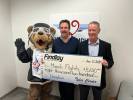Genetic testing can improve cancer survival chances
By KIMBERLEY MCGEE
VIEW ON HEALTH
Luck has been on JoAnn Zwierzynksi's side.
Three years ago she was diagnosed with breast cancer, and it's been one lucky break after another since, the optimistic 39-year-old local nurse said.
As she began her journey, she had no idea the dramatic decisions she would have to make to save her life, and the relief the bad news would eventually bring her.
"Everybody was very shocked I had cancer, but the good thing was it was caught at an early stage," she said. "It was like you are hit by a truck, even with a medical background it was just amazing what I was feeling. I had a bit of depression, but I worked through it. You never know until you are in that position how you are going to feel."
After the diagnosis came in, she was surprised at the swiftness of her emotions.
"I got really nervous really fast," Zwierzynski said. "I saw my (obstetrician/gynecologist) and she couldn't find anything so I was sent to get a mammogram."
The mammogram wasn't quite clear, so she was sent to have an ultrasound. A biopsy later showed that she did indeed have a cancerous lump.
"I was diagnosed with breast cancer and the amazing thing is that I have no family history of cancer, none whatsoever," she said. "It was a surprise to everyone."
But not to her genes, which had been silently working on what they were programmed to do since birth, but Zwierzynski was still in the dark as to what her body was capable of.
She understood what was to come next due to her job as a nurse. She would have a lumpectomy, a round of chemotherapy and radiation to kill any lingering cancer cells to reduce any chances of the cancer returning in her breast or elsewhere in her body.
But her physicians wanted her to take an extra step in her fight against breast cancer. That's when her first brush with luck came her way.
"They asked me to go to genetic testing," she said. "I thought, 'Why not?'"
The results of her genetic testing changed her treatment, her life and her body.
The testing found she was a carrier for breast and ovarian cancers. Because of this, her chances of the cancer returning were, "massive," she said.
"I was set against a total mastectomy," she said, "but after I found out my genetics were positive for cancer, and I found out the percentage of the risks of it (cancer) returning, it totally changed everything."
She met with genetic counselors and support groups as she weighed her options and went through chemotherapy. She had to make a tough decision: continue with the lumpectomy, chemotherapy and radiation or go under the knife for a radical bilateral mastectomy and hysterectomy to improve her chances of living cancer-free for the rest of her life.
"I had great surgeons and great doctors who helped me through this decision," she said. "I can't say enough about Dr. (Lawrence) Gardner and Dr. (Heather) Allen" of Comprehensive Cancer Centers of Nevada.
She underwent chemotherapy after the lumpectomy and was then given a chance to heal before undergoing a relatively new bilateral mastectomy procedure that spared her nipple. Because of this she was able to forgo radiation.
"There's not a zero percent chance that I won't get cancer again, but my chances are dramatically, dramatically reduced," she said.
She decided to have a hysterectomy as well due to the high risk group she now found herself in due to what the genetic testing revealed.
"I've been given a very wonderful opportunity," she said about deciding to undergo genetic testing. "I would never have known if I had not had the testing done of my high risk of getting these cancers in the future."
Another lucky coincidence was living in Las Vegas, she said. Zwierzynski came to Las Vegas 10 years ago on a whim, needing a change. After her diagnosis, the local registered nurse was glad to be here.
"I'm staying here and I am so glad to have the health care I have had here in Las Vegas," she said. "Between my insurance and my doctors, I wouldn't be here today if it wasn't for them. I'm a very lucky person."
She credits the genetic testing and the availability of it through her insurance for saving her life. The fact that genetic testing is a luxury for some without insurance "is a real shame," she said.
"It totally changed my form of treatment, and I probably would not have such a great outcome if I wasn't offered that luxury to be able to get genetic testing," she said.
Anyone in oncology has an interest in genetic testing, said Dr. Heather Allen, M.D., FACP, with Comprehensive Cancer Centers of Nevada. It provides a clearer picture for the physician of the patient's cancer risks and therefore more precise treatment options to eradicate the cancer as much as possible.
"One of the ways we use it is looking at the genes that everyone has that they inherited from their parents and if they have a (marker)," Allen said.
All cancer is genetic but most of the mutations that occur do so during the course of our lives as cells divide and try to fix themselves.
"Those are not inherited mutations, they are mutations that occur as we are getting older," Allen said. "When talking about genetic testing we are looking at genes that you may have inherited and gotten cancer."
Genes come in pairs, with one side from each parent. Through proteins they encode, genes determine how efficiently the body works, by detoxifying, processing food and responding to infection or disease. Each of us has between an estimated 50,000-100,000 genes that are contained on the 23 pairs of chromosomes that make up our genetic blueprint. Each gene has a particular set of instructions. Our unique DNA code determines the functions of each of our genes. More than 4,000 diseases are thought to stem from mutated genes inherited from family. Common disorders such as heart disease and most cancers have been linked to genes and outside factors such as environment and lifestyle. Genetic testing can find Fragile X syndrome for those looking to start a family, sickle cell disease, Alzheimer's, Multiple Sclerosis and stroke. Knowing what your genes are capable of can assist someone facing cancer or other adult on-set disease such as Alzheimer's to live a longer life through better treatment. Genetic testing can also rule out that you may be susceptible to these diseases or future ill health.
The most important thing for everyone to know is their family history, Allen said, to the best of your ability. Understand the diseases that various members of your family have had or currently have and what caused them to die. And not just siblings, parents and children, but also second degree family members such as aunts and uncles on both sides of the family.
And be specific. For instance if Aunt Sally died of cancer, it is important to know if it was ovarian or cervical, as that can make a big difference in treatment options.
"You need to know as accurately as possible and make that known to your primary care doctor because they are in a good position to help you," before you get to the point of needing an oncologist, Allen said. "If members of your family have breast cancer, it's important to know and look at your pedigree and know that you can have it or not."
The benefits of genetic testing are significant.
"Definitely if you have a strong family history of cancer that is something you have to be concerned bout and have the testing done," Allen said.
One hiccup in the testing is that if you don't have a large history to look back upon, or if you have a limited family history either because you don't have that many family members or are not in touch with family members, that can sometimes affect who is tested and who isn't tested.
Many are afraid of testing, Allen said, for different reasons. Many who should be tested due to family history have seen what the disease they are marked for can do to a person, particularly Alzheimer's and aggressive cancers. That can have a major psychological impact on their decision to know whether or not they carry that particularly gene.
"Some people just don't want to know if they will get Alzheimer's or cancer," Allen said. "Before you ever do genetic testing on anyone, you want to do genetic counseling on someone."
Comprehensive Cancer Centers offers a wide net of support, classes and counseling referrals to its patients, a vital component to genetic testing, Allen said.
There's also the financial worries of knowing you carry a certain gene that can lead to bad health or decreased mental abilities.
"Some people have fears, and I'm not sure if that's legitimate, that (after testing) they may not be able to get life insurance," she said. "Theoretically that shouldn't be an issue."
A simple blood test is all that is required for genetic testing. Although genetic testing doesn't offer a cure, it can provide a more accurate diagnosis and potential threats for future risks.
"Someday it will be made available for all of us to just go and have a test," she said. "The genetic counseling part is every bit important as the testing part. We can then tell people what their options are."
Zwierzynski will celebrate her three year anniversary of her diagnosis February 29, 2011. It's a day she looks forward to, with a bit of trepidation.
"You are always waiting for the other shoe to fall," she said. "No matter what happens, it's in the back of your head. But I feel optimistic with all of the support I have through Dr. Allen and the Susan G. Komen foundation. It's just amazing."























